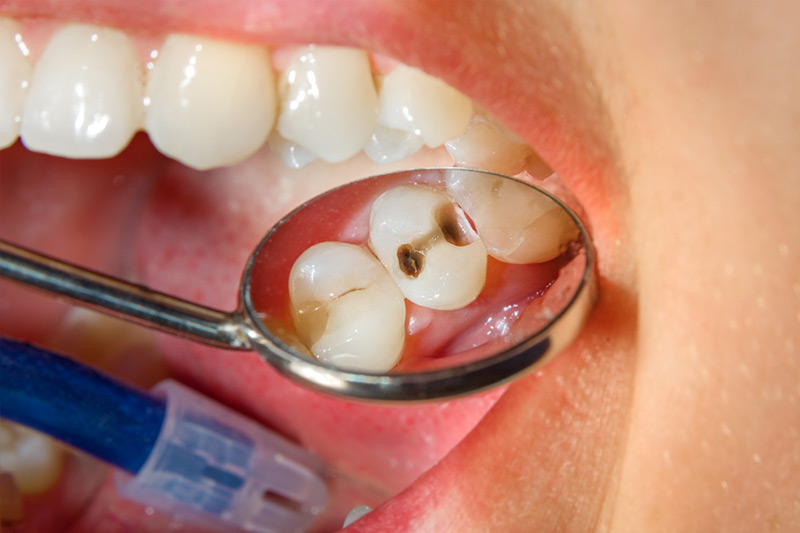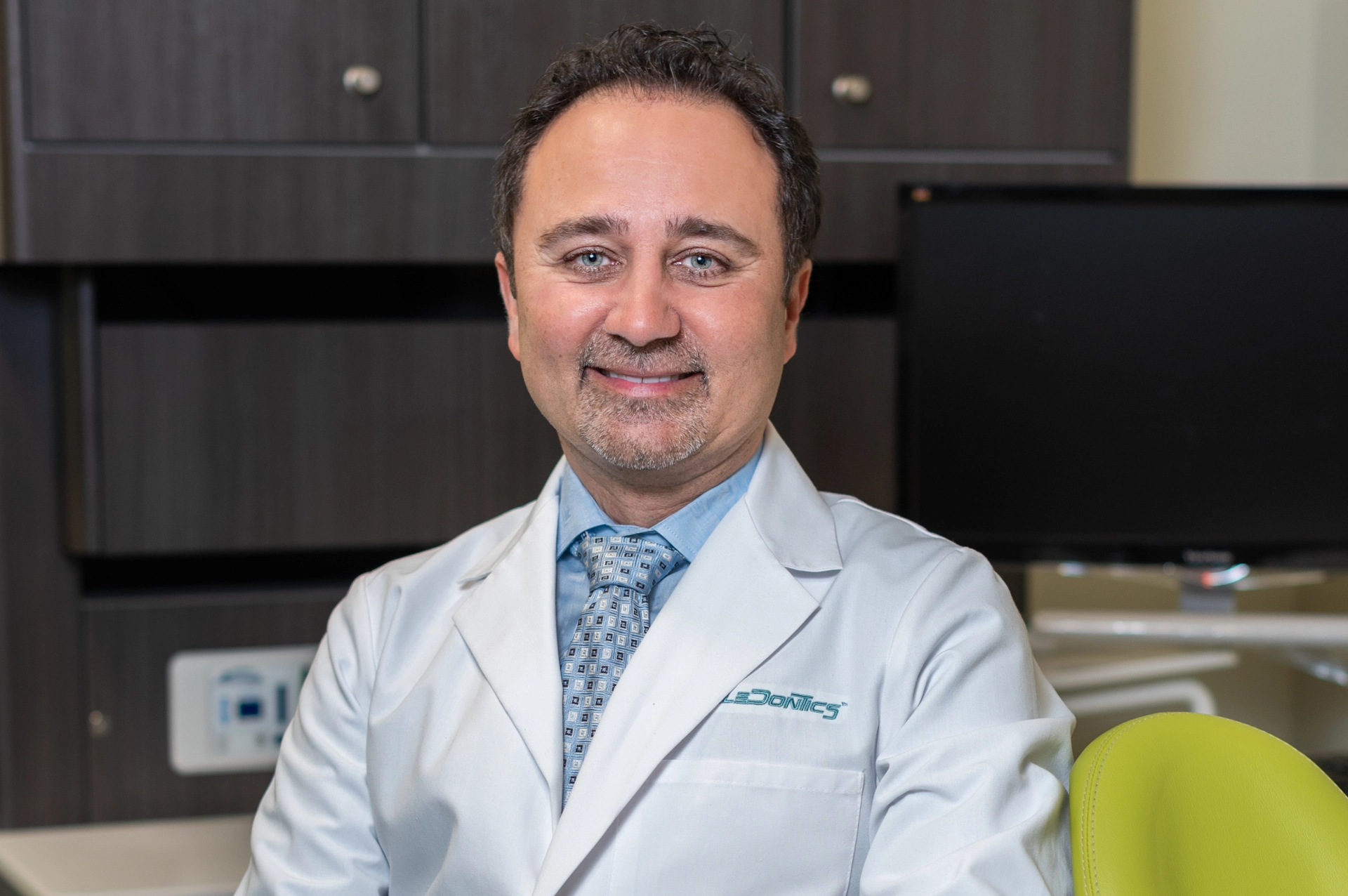
If you’re like most people, you probably think cavities happen when you eat too much candy and don’t brush your teeth enough, but get this — the real story behind these pesky holes in your teeth is way more complicated. Stick with me and I’ll fill you in on what’s really causing your cavities.
What Causes Cavities in Teeth?
Sure, sugar plays a part, but it doesn’t drill holes in your teeth all on its own. Cavities form when acids created by mouth bacteria dissolve through the outer layer of your teeth. These bacteria feast on sugary and starchy foods, then disperse acid that breaks down tooth enamel and attacks the sensitive dentin underneath. But sugar is just the food for bacteria to create acids that lead to tooth decay.
There are other factors that contribute to cavity formation, too, including decreased saliva production (which often occurs in adults who drink alcohol regularly or smoke).
When you’ve got overgrown bacteria populations, decreased saliva flow, and a less-than-ideal diet, your risk for cavities skyrockets.
What Foods Cause Cavities?
You can blame all those Halloween candy cavities on things like sugar and citrus, right? Well, yes and no. It turns out starchy foods like bread, pasta, rice, and potatoes can be just as bad when it comes to what causes a tooth cavity. Constant snacking gives bacteria an all-day, all-you-can-eat buffet to fuel their acid attacks. Goodbye enamel and hello cavities.
What Bacteria Causes Cavities?
The usual suspects like Streptococcus mutans and Lactobacillus are some of the main bad bacteria in the mouth. They churn out lactic acid as they digest carbs and sugars, lowering your mouth’s pH level and acidic environments just make these acid-loving microbes multiply even faster.
It’s a vicious cycle — more bacteria make more damaging acid, which lowers pH, allowing more bacteria to thrive. Occasional acid spikes from these bacteria lead to mineral loss and small lesions in the enamel which can slowly turn into full-blown cavities.
Diet and hygiene habits tip the scales allowing specific microbes to take over. Things like antibiotic use and infrequent brushing/flossing let acid-loving bugs dominate while beneficial bacteria get pushed out.
Can Genetics Contribute to Cavities?
Research shows genetics can play a secondary role in cavity risk. Certain genes affect tooth formation, saliva pH, and your mouth’s microbial makeup.
While DNA influences susceptibility, diet and self-care routines are bigger risk factors for getting cavities than genetics. Luckily, these are things that you can control day-to-day, meaning cavities don’t necessarily have to be inevitable!
Even if your genes put you at moderately higher risk, you can manage bacteria growth and protect enamel through proper brushing, flossing, and avoiding excess sugars/acids.
How Can I Help Prevent Cavities?
The best way to avoid cavities is to disrupt the environment where acid-loving bacteria thrive. This means limiting sugar/starch intake, restricting between-meal snacking, and avoiding acidic foods that erode enamel.
Having a healthy oral hygiene routine that includes brushing twice daily, flossing, and using fluoride-containing toothpaste helps balance your mouth microbiome and protect against decay. If at high risk for cavities, additional fluoride rinses or hydroxyapatite can boost demineralization.
Note that you should strive to choose anticavity routines and products that are catered to your age and stage of life. If you are an adult that is at a low risk of swallowing flouridated products, for instance, and you have had more than two cavities in the past two years, choosign products with flouride may be wise. Otherwise, choosing a product with hydroxyapatite (a substance naturally found in tooth enamel and dentin) may be a better choice.
Supermouth age-appropriate dental care and cavity prevention products make it easy to prevent cavities through establishing regular oral health routines and building back enamel to protect further erosion.
Trying to figure out what is or isn’t good for your oral microbiome, which products are reputable, and how to use them can seem difficult if not overwhelming. And when you’re choosing products for your children, you want to be 100% certain that you get it right.
That’s why Supermouth products take a S.U.P.E.R. approach to oral care and cavity prevention, taking the guesswork out of cavity prevention and complete oral care:
- Safe: You won’t find any artificial flavors or colors, antibiotics, SLS, non-GMO products, artificial sweeteners, or preservatives in Supermouth products.
- Unified: Every product has a purpose but they all work together as a system. As you probably are now beginning to understand, the mouth is a complex system, and doing one thing really well (i.e. avoiding sugar) won’t necessarily lead to cavity prevention if you’re ignoring other risk factors such as good oral hygiene or mouth pH.
- Playful: Oral care is boring far too often. Why shouldn’t it be fun?! Why shouldn’t it be SUPER?! This is especially true when it comes to establishing healthylifelong routines for your children.
- Effective: Vitamins, minerals, and prebiotics combine with other proven ingredients like Hydroxapatite in SuperMouth’s patent-pending formulation, Hydroxamin®.
- Reputable: SuperMouth products have been engineered by engineers and dentists based on scientific research.
Final Thoughts
The moral here is that cavities are multifactorial, so we can’t put all the blame just on candy and forgetting to floss. What causes cavities? Your genetic makeup, bacterial balance, saliva production, vitamin intake, and other factors combine to determine your decay risk.
To learn more about the connection between your oral health and overall health, try reading Dr. Kami Hoss’s book “If Your Mouth Could Talk”!
Looking for products for you or your child that meet them where they are, in terms of education level, age and stage, and specficic oral needs? Shop SuperMouth mouthcare systems now.

